Personal branding is about taking responsibility over how you present yourself. If you strive to position yourself as an expert or become an influencer within your niche, self-branding can help increase your reputation as a leader. By showcasing unique character traits and having an active presence online, you can work towards building a personal brand that resonates with people all over the world. This article will guide you through the steps towards branding yourself with ten personal branding tips.
Post Contents
- What is Personal Branding?
- Why is Personal Branding Important
- How to Improve Your Personal Brand
- Where Personal Branding Has Not Been Successful
- Branding Yourself: 10 Personal Branding Tips
- Be Authentic: Personal Branding Tips
- Blogging for Personal Branding: Personal Branding Tips
- Provide Value: Personal Branding Tips
- Step out of the spotlight: Personal Branding Tips
- Be consistent: Personal Branding Tips
- Network: Personal Branding Tips
- Become a Creator: Personal Branding Tips
- Be an Expert: Personal Branding Tips
- Amplify Yourself: Personal Branding Tips
- Be Social: Personal Branding Tips
- Conclusion
- Want to Learn More?

Don’t wait for someone else to do it. Hire yourself and start calling the shots.
What is Personal Branding?
Personal branding is the practice of creating a brand around a person rather than a business entity. Personal branding is used to help further people’s careers by positioning them as an expert within an industry. By developing a personal brand, a person can grow their social following to help them secure a better job, sell more products in their business, and increase better opportunities in their career. Building a personal brand is not something that happens overnight, it can take lots of planning and months of hard work to start seeing the results; sometimes you need to improve your personal brand after receiving feedback. This type of branding can also be called self-branding, and these will be used interchangeably in this article to mean the same thing.
To grow your own personal brand, you can write a personal brand statement. A personal brand statement sets out who your audience will be, the value you want to give to your audience, and why people should follow you (your USP). While building your personal brand, you should pull from this 1-2 sentence statement to ensure that you are remaining true to it.
Why is Personal Branding Important
Personal branding is important because it helps give a person more credibility. It’s never been more competitive to land a new job or earn a paycheque. With more people building personal brands, you need to put yourself out there to get noticed. Personal branding can let recruiters find experts like you with ease, especially if you’ve been blogging brand yourself. If you’re trying to land a higher position at a new company, you can showcase key data such as the number of followers you have, how much traffic your website gets or other vital metrics which can give you a competitive advantage over other candidates. Think of it almost like an online portfolio about yourself. Branding yourself allows more people to get to know who you are and how you bring value.
It can also help you land new opportunities like business deals or marketing partnerships that you wouldn’t otherwise have, especially if you’re a person of influence. Self-branding instills trust and credibility in your knowledge and your abilities, so companies know that partnering with you will improve their brand awareness. Branding yourself in an authentic way by showing your personality is an excellent way of differentiating yourself from others in your field and developing your personal brand. We will talk more about this later.
How to Improve Your Personal Brand
Once you have started to work on your personal branding, feedback and ensuring your self-brand is aligned with your personal branding statement will help you improve on your progress. Personal Branding has been hugely successful for many different people, but without your personal branding statement, it can be hard to know when you have achieved success in your endeavors. It is essential to know what progress looks like to improve your personal branding.
Follow these steps to improve your personal brand.
- Research and create your personal branding statement: Define your audience at this stage and audit competitor that may exist for you.
- Build a personal branding strategy: Plan how to engage with your target audience and define what success will look like for you in two months, nine months, two years.
- Monitor your personal brand engagement: Promote positive participation and have a plan of action for negative remarks.
- Develop your personal brand: Aim to share your personal brand through social media, networking, outreach, and speaking opportunities. Consider blogging, vBlogging, Podcasts and other ways that you could promote your personal brand in a way that your audience will consume the content quickly.
- Have a communication plan: Controlling your presence online can be time-consuming so this plan will help you with negative backlash and help you to easily provide information to partners that you will work with down the line.
- Measure your success regularly: Set some KPIs for personal brand success so that you know you are heading in the right direction. Celebrate even small wins to remain motivated to achieve more.
So after doing all this how do you know if you have been successful in building a personal brand? A few valuable KPIs include:
- When a sale converts through your blog
- When you are asked to speak at an event or on a podcast
- When someone refers you to a potential client
- When a publication reaches out to invite you to guest blog
- When people start mentioning you online, on social media, their blog or other important media
Where Personal Branding Has Not Been Successful
Branding yourself is not an easy feat. It is time-consuming, slow and sometimes hard to stomach. Receiving negative feedback online can knock you even if you have a great communication plan, and sometimes you don’t feel like being the brand you have built. We highlight a few things to consider when branding yourself so that you can improve your self-brand quickly.
- Ignoring Other Influencers: Chances are you are not the only person in your industry building their personal brand, and others have been there longer. Do your research to make sure what you aim to achieve has not been done before. List your competitors, monitor them often to know what they are doing and see if you can borrow an idea or two off of them. Identify potential partners who you can reach out to and ask advice, so you don’t waste time on worthless ventures.
- Ignoring Your Followers: Once you have built even a small following, make sure you listen to what they are saying. If you promote a product and they don’t like it, find out why and decide if it is the best product to partner with. Read the comments after your social media posts to get a good idea of what your following enjoys and use a search engine to search your name online. You might uncover something about yourself that you didn’t know about before.
- Generating Subpar Content: Slacking off is never the right choice, especially when you are trying to build a brand around your knowledge in the area. Keep yourself in tune with your industry and if you are not a great writer, choose a different medium to promote yourself or hire a freelancer to help you up your game.
- Branding Yourself Wrong: Without the right research you can end up creating a personal brand that nobody wants to get behind. If your industry is old fashioned and you want to breathe life into it, make sure to research if this will be met with positivity. Go out into the industry and ask the hard questions first before diving into branding yourself the utterly wrong way. It is important to mention here that your personal brand should be your true self and not something that you create. The more natural you are, the easier it is to remain consistent over time.
- Not Being Consistent: Being consistent is the most critical element of self-branding. People who change their belief system at the drop of a hat cannot be trusted in what they say in their content. Trust is ultimately what followers want. Followers identify with specific thought structures, and they follow people who think similarly to them. If you change these fundamental beliefs, followers will not trust in your personal brand any longer.
- Forgetting The Longer Term: For a personal brand, long-term is essential so you know where your brand is going. If you plan to provide how-to videos for makeup with your audience being beginners or young people interested in improving the makeup abilities do you want to advance these videos long term as your followers advance, or will you be happy to remain at the same level, always providing beginner tutorials? These things should be thought about in the early stages of your planning process so you can slowly move in the right direction.
Branding Yourself: 10 Personal Branding Tips
-
Be Authentic: Personal Branding Tips
When it comes to self-branding, being authentic is essential. But what the heck does that mean? It means be yourself. Everyone’s got their own quirk. Maybe you randomly burst into song in the middle of a conversation. Or maybe you have a really different way of dressing yourself. There’s something about you that makes you an original. And if you’re serious about branding yourself, now’s the time to come to terms with your quirkiness. Truth is, that special trait is what will make you stand out on a planet of 7 billion. Celebrate your differences and let your true self show.
Personal Brand Examples: Gary Vaynerchuk
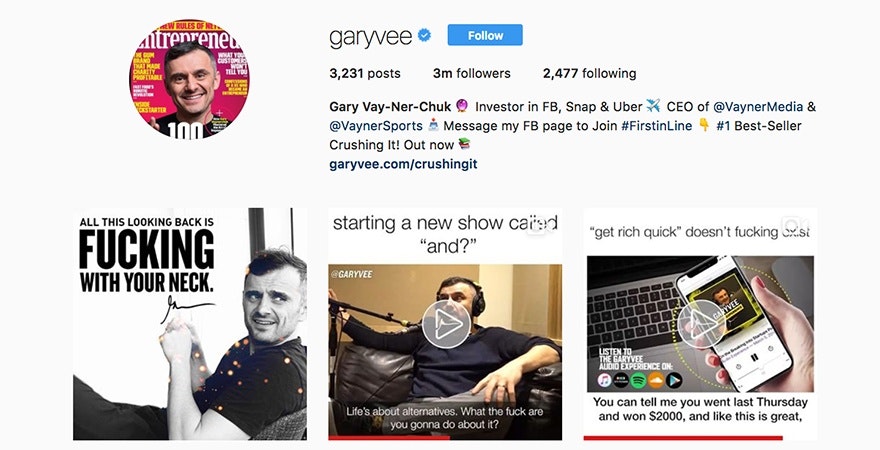
Who’s the most authentic person that comes to mind when you think of individual branding? Yeah, none other than Gary Vaynerchuk. I met him a few years ago at the Traffic and Conversion Conference in the hotel’s lobby and he’s about as real as it gets. The most noticeable thing about him is that he just doesn’t censor himself. He’s probably more likely to turn down a speaking gig that asks him to tone down the swearing than he is to actually tone it down. But that’s what we love about him. He talks to you the way you talk to your friends. He doesn’t walk around in an expensive suit reminding you that he’s more successful than you. Even though he is. He’s a down to earth kind of guy. I once messaged him on Instagram and he responded to me within 10 minutes. Who does that? Nobody.
Gary Vaynerchuk’s personal branding journey started on YouTube when he was promoting his online store Wine Library. Have you ever seen the videos? Here’s his first video. It basically looked like a home video from the 90s despite being from 2006. He just sat in front of a camera and drank wine. Why am I mentioning this? Because even Gary Vaynerchuk started building a personal brand in the most low budget way possible. So you can too.
-
Blogging for Personal Branding: Personal Branding Tips
Blogging for personal branding is one strategy used by many of the top influencers. Why does it work? Well today, you might be a nobody with no voice. But if you consistently create content within your niche for at least one to two years, eventually you’ll be building an audience around yourself. There’s two ways to approach blogging for personal branding. First, you can build your own blog. This personal branding strategy will require the most upfront work but will ultimately be the most rewarding. Or you can write guest posts on top blogs within your niche. This will allow you to build an audience faster but you don’t own any of the virtual properties.
Personal Brand Examples: Rachel Parcell
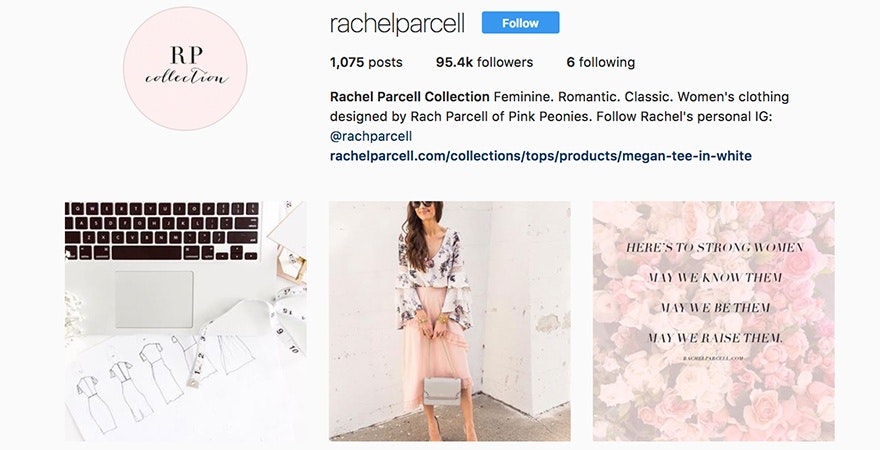
Rachel Parcell started building her personal brand with her blog Pink Peonies. On her blog, she writes about fashion, beauty and lifestyle. She’s been in the fashion blogging space for years and has built up a reputation as an influencer. As a result, she currently has amassed over 973,000 followers on Instagram alone. She decided to monetize her blog by creating an online store under her name Rachel Parcell. What does she sell? Fashion. And she models her own clothing line too. Her self branding has paid off. How can you get a similar result? Your online store has a blog section. Use it. Blogging for personal branding is a great way to build an audience around you while monetizing it through your store’s sales.
-
Provide Value: Personal Branding Tips
When people say provide value it usually sounds like fluff. Here’s what it means: Say you’re selling makeup products. You could either be the brand that solely runs ads. Or you could build the personal brand where you create makeup tutorial videos, write articles about common makeup questions, host a stream of makeup inspiration ideas for different seasons or events. While a customer could very well buy from a brand that solely runs ads, they’ll be more likely to buy from an ad run by an influencer who provides value. Why? Because that influencer helped them and taught them something new even before they were ready to buy. That brand is at top of mind.
Personal Brand Examples: Mimi Ikonn
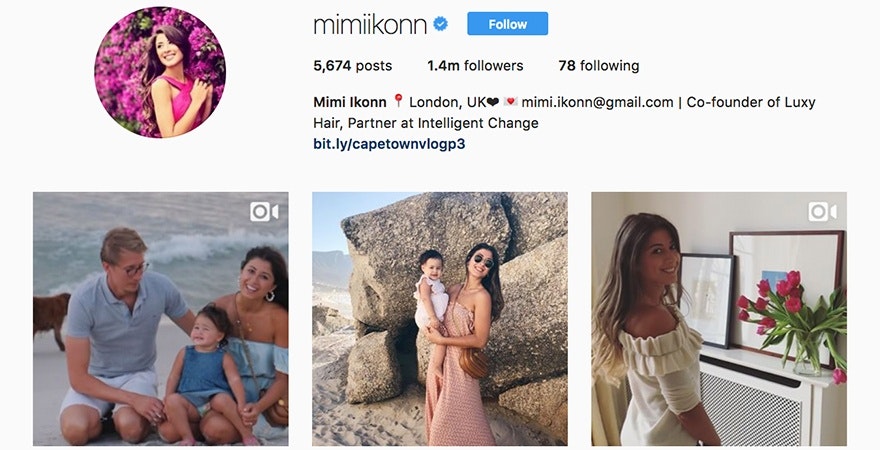
Mimi Ikonn’s personal branding strategy is all about providing value. She rose to fame with her YouTube channel for her Luxy Hair brand. In her videos, she’d create hair tutorials that people can follow along with. She’s subtly show her hair extensions in her videos without making them the focus of it. Occasionally, she’d create videos about hair extensions but even then the focus centered on value based content like how to pick the right color and how to clip them in. It’s unsurprising that she’s currently built a following of 3.1 million subscribers. Now that’s how you build an effective personal brand.
-
Step out of the spotlight: Personal Branding Tips
I know it seems counterintuitive but being in the spotlight all the time can take a toll on your life. Plus, sometimes people need to miss you for a bit to realize how much they need you in your life. Think of Taylor Swift. Before she launched her latest album Reputation she hadn’t posted on social media for nearly a year. She completely stepped out of the spotlight as she started recognizing the toxic side of fame. When building a personal brand, you’ll realize that there is a downside to too much attention. It’s okay to step out of the spotlight every now and then to build yourself back up.
Personal Brand Examples: Kylie Jenner
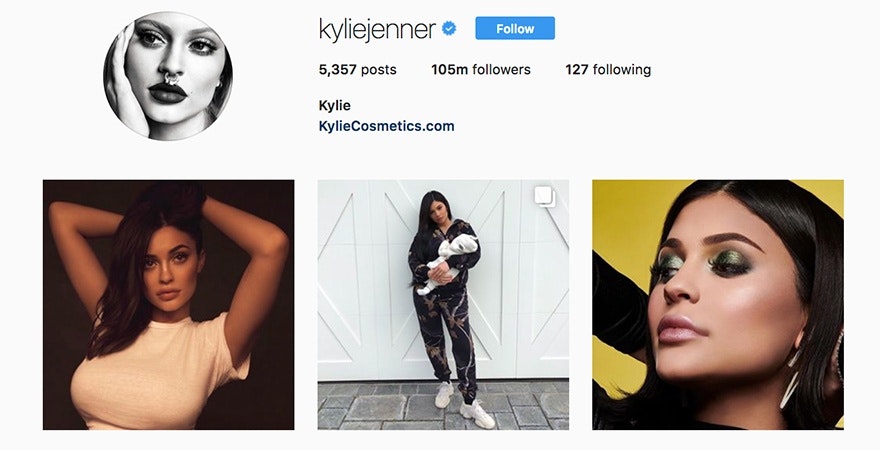
Kylie Jenner being apart of the Kardashian clan is always going to be a public figure. Whether it’s her family’s reality show or the cover of a tabloid or the success of her Kylie Cosmetics brand, there’s no escape from the spotlight for her. However, she shocked everyone by keeping her pregnancy private. She avoided going out in public, never mentioned her pregnancy on social media. She took an important moment in her life and kept it out of the spotlight until she was ready. Once her daughter was born, she explained to her fans why it was important she kept it private.
-
Be consistent: Personal Branding Tips
Consistency is the secret sauce that winning personal brands have in common. Consistency isn’t only about posting on social media every day. It’s about unifying the brand look and messaging. Do all your social media posts look different or do they look the same? Some will tell you that you need to have variety with your content but truth is the more consistent you are the easier it is to grow a following. If your favorite pop singer suddenly created a jazz album you’d probably lose interest because you prefer the original music they created. Same with personal branding. Your audience will fall in love with the way you present content. If you change tunes, they’ll jump ship.
Personal Brand Examples: Manny Gutierrez
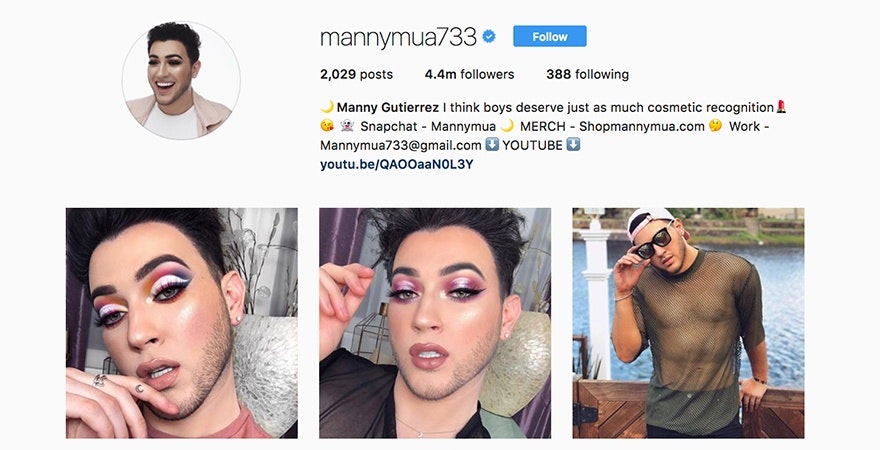
Manny Gutierrez’ personal branding is fairly consistent. He’s a beauty influencer on YouTube who creates makeup tutorials on his channel. If you check out his Instagram account, you’ll see that most pictures are of upclose makeup looks. Noticeably, most of the makeup is more dramatic with vibrant colors that have that extra pop. So makeup lovers who are looking for a more dramatic look would likely follow his Instagram account and subscribe to his YouTube channel to try out a similar style. He also has an online store called Manny Mua allowing him to better monetize his YouTube channel. You’ll notice that a couple of t-shirts and a pop socket has some vulgar language on it. That’s likely because he often swears on his YouTube videos which maintains the consistency of how he communicates even throughout his products.
-
Network: Personal Branding Tips
It’s hard to master branding yourself if you never put yourself out there. Start that blog, hit up that Meetup event, mingle with people at conferences, grab that cup of coffee with a stranger, post on social media every day. The more you interact with people, the larger your network becomes. While you may be tempted to stick to a niche focused network, the smartest thing to do is to expand into other categories. You never know when you’ll meet someone who offers a different perspective or who’s expertise is in an area that you’ll need to know more about down the road.
Personal Brand Examples: Doug the Pug
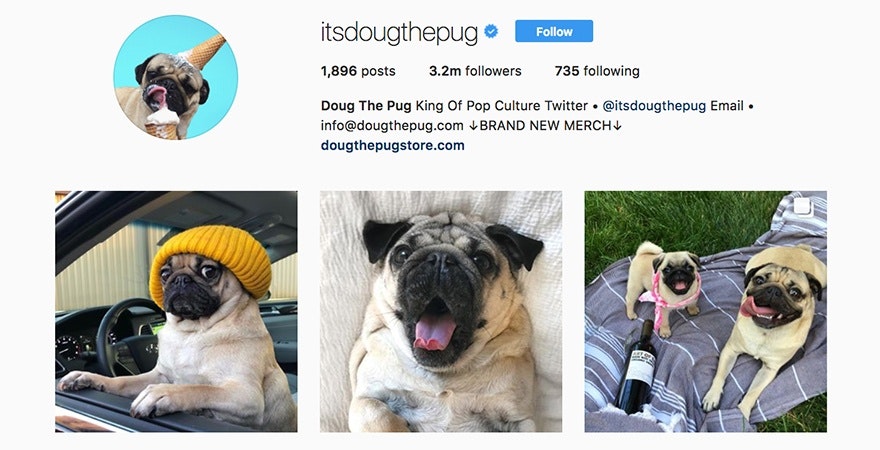
I know it can be a little weird to add an adorable pug to this list, but when you have 6.1 million fans on Facebook and 3.2 million fans on Instagram, it’s pretty safe to say you’re the King of Personal Branding or as Doug the Pug would say King of Pop Culture. Doug the Pug is one of the most networked dogs in the world. He’ll regularly attend dog events, media interviews, concerts and more. When his social media posts don’t include pictures of him surrounded by pizza, they often include photos of him with other influencers. Why is this effective? Because those influencers share the picture on their social media tagging him which helps boost his social following. And by growing his followers, he can sell more products on his Doug the Pug Store. So when you hang out with other influencers, take a quick photo and post it on social as it could help you strengthen your personal brand.
-
Become a Creator: Personal Branding Tips
Some build a personal brand by being controversial. This can sometimes backfire and result in a lot of negative publicity. The safer way to create a great personal brand is to become a creator. Whether you create your own online store, a unique product, or content, don’t underestimate how important creation is. The best influencers are creators and doers. So start that online store, create that YouTube channel and actually commit to posting each week or write guest articles on notable blogs. Hiding behind your computer and spending your weekends watching Netflix isn’t going to help with self branding.
Personal Brand Examples: Carli Bybel
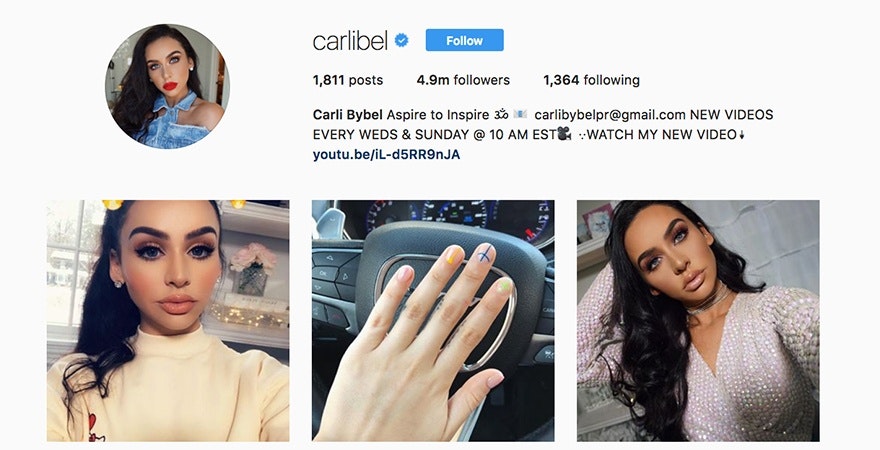
Carli Bybel’s personal branding story started out on YouTube. She constantly creates beautiful makeup looks on her channel. To better monetize her influence, she also created a makeup kit which she often uses on her channel. While she doesn’t have her own beauty store, she does sell her product on the popular BH Cosmetics website. The product is so popular that customers are restricted from ordering more than four of it. Thus, showing how a personal brand can help drive stronger sales growth. Aside from creating YouTube videos and her own beauty product, she also created her own blog where she has covered fashion, beauty and hair. She’ll post pictures of herself modelling different looks with some written content in between.
-
Be an Expert: Personal Branding Tips
Branding yourself can be hard when you don’t have an area of expertise. Every influencer has his or her own niche. If you have an online store selling tools you might want to make sure you’re an expert in carpentry, furniture design or some sort of relevant niche. If you sell car parts, you should probably build up your expertise in the automotive industry so you can provide value. Another way to look at it is to build a brand around your own area of expertise. Say you worked at a hair salon for five years, you might build a personal brand where you share your expertise on hair issues while selling hair products.
Personal Brand Examples: Michelle Phan
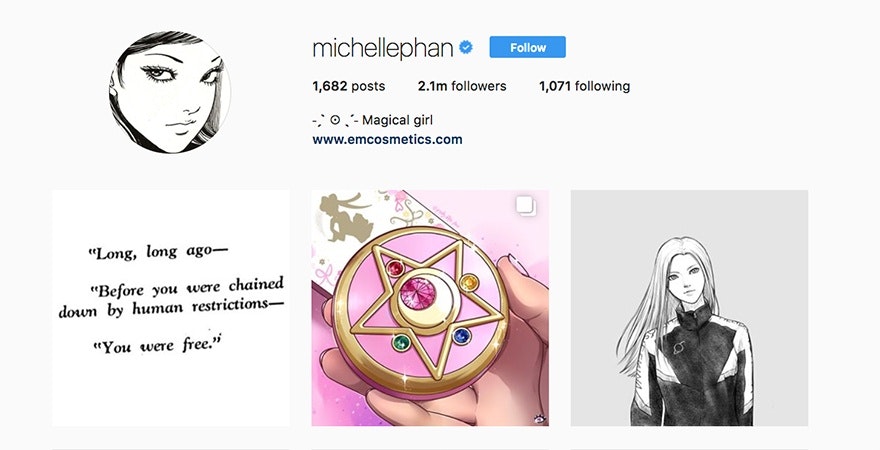
Before Michelle Phan started self branding on YouTube, she was an art major at an arts school. She applied her degree to makeup artistry and quickly built up a loyal following on YouTube where she’d host makeup tutorials. Eventually, she stopped creating YouTube videos and focused on her brands. She cofounded and created two brands: Ipsy and EM Cosmetics. Considering her experience with makeup tutorials moving into creating makeup brands made sense for her career. Her personal brand helped elevate her business as in 2015 her business was valued at $500 million.
-
Amplify Yourself: Personal Branding Tips
Earlier in this article, we talked about being authentic. Amplifying yourself is the second step. In a crowded world, it can be hard to stand out. Amplifying yourself is where you take the essence of who you are and run wild with it. For example, say you’re a risk taker. If you want to build a personal brand around how you love taking risks, you might create content of you doing a bunch of daredevil activities. Kind of like how Nik Wallenda tightroped across Niagara Falls or Felix Baumgartner did a supersonic fall from the edge of space. You might not do something as extreme but you’d do more extreme activities that the average person wouldn’t do.
Personal Brand Examples: Simeon Panda
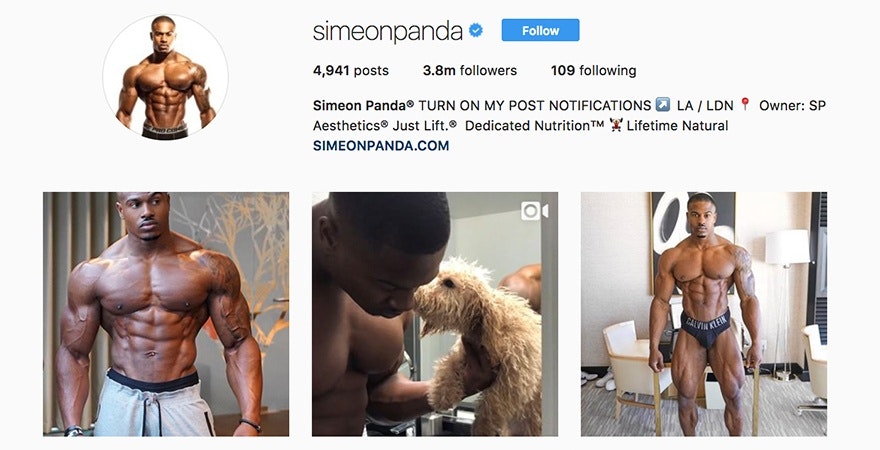
Simeon Panda is created a personal brand around his physical appearance. After all, it’s hard to be taken seriously as a fitness expert if you aren’t fit. He’s been featured on the cover of magazines for his impressive physique. It’s not just that he’s in great shape, his muscles are massive compared to the average person. He amplified his physical appearance to stand out in the fitness niche. On his online store, Simeon Panda, he sells online training content and fitness equipment. If he hadn’t amplified his physical appearance his online training videos wouldn’t be as compelling. However, those who’d love to have bigger muscles and stronger bodies may choose to buy products he sells to help get a similar body.
-
Be Social: Personal Branding Tips
Personal brands can’t be built without human interaction. Of course, many influencers eventually reach a point where they interact a little less with their fans. But if you’re just starting your self branding, you probably want to respond to messages from your followers. It’s just good for business. Take the time each day to interact with your followers on social media. Did someone tag you in a post? Respond to it. Was one of your articles shared on social media? Thank them. Does a customer have a question about your product? Answer them. People want fast responses. It’s important to humanize your personal brand.
Personal Brand Examples: Eric Bandholz
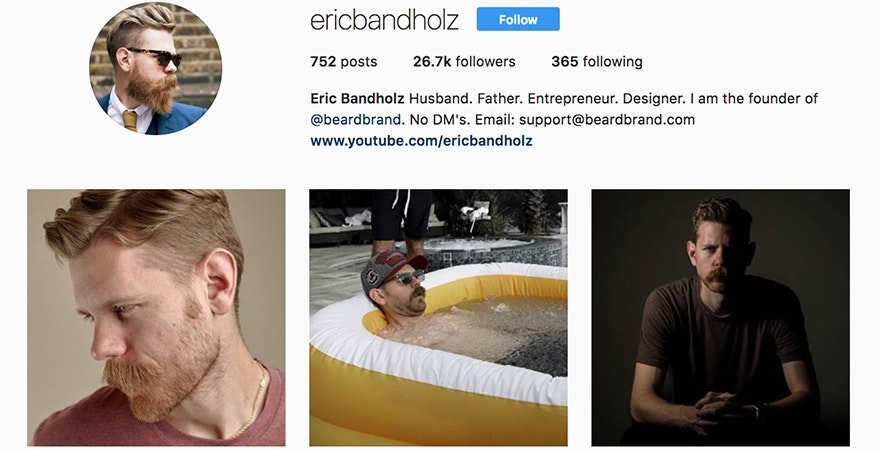
Eric Bandholz, founder of Beard Brand, actually engages with his followers on social media. While he doesn’t respond to DMs on Instagram, he does respond to public comments despite having over 26k followers. You’ll also occasionally find messages from him on his brand’s YouTube channel.
Conclusion
Building a personal brand can help elevate your business to new heights. By following a combination of the personal branding tips such as being authentic, consistent and social you help increase your chances of success in your career. I know it can be scary to put yourself out there but the reward is much greater than the risk. You can have the power to really make an impact in the world. Your legacy lies in your hands.
Are you considering building a personal brand? Let us know in the comments!
Want to Learn More?
- How to Get Press Coverage for Your Online Store
- How to Get Free Media Coverage
- Co-Marketing and Partnership Marketing Tips and Tricks
- 10 Branding Statistics You Need to Know in 2021 [Infographic]
